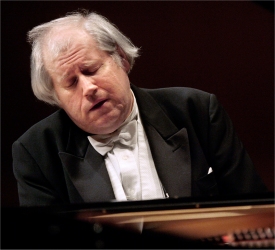Recording of the Week,
Grigory Sokolov plays Schubert and Beethoven
Around this time last year, I wrote enthusiastically about Grigory Sokolov's first release on Deutsche Grammophon, so it was with great excitement that I learned of his second offering, featuring music by Schubert (Four Impromptus, D899 and Three Klavierstücke, D946) and Beethoven (the mighty Hammerklavier sonata, op. 106).

For me, part of what makes Sokolov such an extraordinary pianist is his use of rubato and his flexibility with tempo: the way he will fractionally delay the second beat of a bar so as to highlight an accent in the first Schubert Klavierstück, for instance, or the space he creates by extending the quaver rests at the end of each phrase of the fourth Impromptu just to give a lift to the music, is really something rather special. Artur Schnabel was once quoted as saying “The notes I handle no better than many pianists. But the pauses between the notes - ah, that is where the art resides!” How true this is too for Sokolov!
Incidentally, Sokolov performs the long version of this first Klavierstück, by which I mean that he includes the section that Schubert had crossed out in his original manuscript, but which was restored by Brahms when he was producing the first edition. I think I'm right in saying that nowadays most pianists (including Pollini, Brendel, and Paul Lewis) opt for the shorter version, and it is true that including this extra section does make it quite a long piece (over fourteen minutes), but when it's Sokolov playing I really don't mind!
As elsewhere, rubato is deployed to great effect in this piece, such as to highlight the peak of a crescendo just before the return to the A section. His tone in the slow B major section is enchanting, and the way he shifts colour with the repetition of a phrase is quite remarkable. Similarly, his playing at the start of the first Impromptu is nothing short of breathtaking; I can't recall the last time I heard such a beautifully hushed pianissimo sound. Truly exquisite playing.
So then onto the Beethoven. What can I say about this juggernaut among piano sonatas? My initial reaction was that it seemed to be a fairly unusual interpretation, and certainly the very opening didn't immediately bowl me over in the way that the Schubert did. I’ve been pondering quite a bit why this was, and I think part of it may be that his tempos throughout are often slower than I was used to, particularly in the first movement, which is more measured than one usually hears, introverted, dreamy almost, and perhaps less “frenetic”, for want of a better word, than, say, Richter or Brendel. Even in the opening bars he can't resist a bit of rubato, shaping and crafting the end of the second phrase where most people plough through!
Overall, I think this must be one of the slowest Hammerklaviers on disc: he is just short of 53 minutes, where, for comparison, Pollini takes about 43 minutes. The important thing, though, is that, my initial reaction aside, it doesn’t feel ponderous or plodding, and it's certainly never boring. Although Sokolov's slow movement takes well over twenty minutes, never does the pace sag or seem as if it doesn’t know where it is going. Having heard it many times recently I think I now understand what he was after: it's a slow burn that draws you in with the steady brilliance of the playing, and by the end the cumulative effect is quite overwhelming. Another masterful performance from Sokolov!
Grigory Sokolov (piano)
Available Formats: 2 CDs, MP3, FLAC



